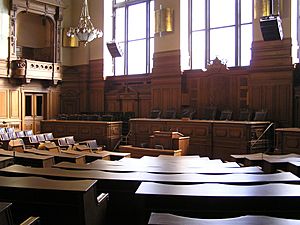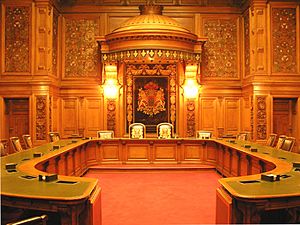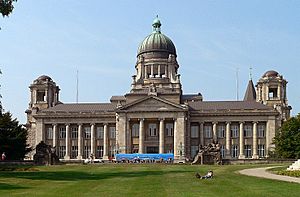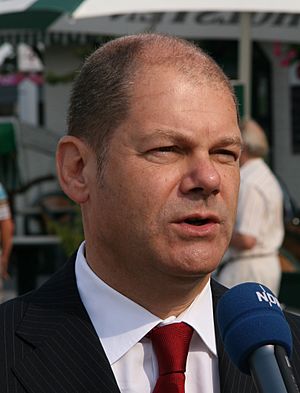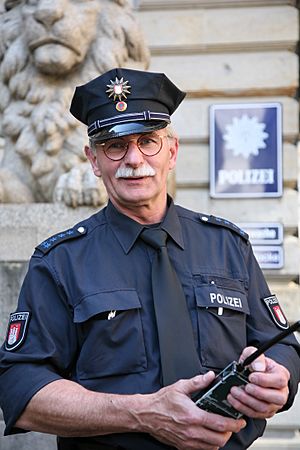Government of Hamburg facts for kids
The government of Hamburg works like a team with three main parts: the executive (who carry out laws), the legislative (who make laws), and the judicial (who interpret laws).
Hamburg has two levels of government. One level manages the whole city, and the other handles local areas called boroughs. Since Hamburg is also a federal state in Germany, its city-wide government has more power and responsibilities than governments in regular cities.
The leader of Hamburg's city and state government is called the First Mayor (Erster Bürgermeister). In Hamburg, a government department is called a Behörde (office), and a state minister is known as a Senator.
The law-making body is the state parliament, known as the Hamburgische Bürgerschaft. The courts make up the judicial part of the government.
The main building where the government works is the Hamburg Rathaus.
Contents
How Hamburg's Government Works
Hamburg's government has a clear system where different parts have different jobs. This is called the separation of powers.
Making Laws (Legislature)
The power to create, change, and approve laws belongs to the parliament. People in Hamburg can also vote directly on laws through a plebiscite or a referendum, thanks to Hamburg's Constitution. In other German states, the parliament is called a Landtag.
The parliament has many jobs. It is responsible for making laws and electing the Erster Bürgermeister (First Mayor) for their term. It also checks on the Senate (cabinet). Hamburg's parliament is a unicameral parliament, meaning it has only one chamber. The 121 members are elected every four years by fair and secret votes.
Carrying Out Laws (Executive)
The executive part of the government is called the Senat der Freien und Hansestadt Hamburg (Senate of Hamburg or cabinet). Its main job is to make sure laws are followed. The Senate handles the daily running of the city, and the First Mayor is its leader. The Senate also represents Hamburg when dealing with the national government or other states and countries.
The Senat der Freien und Hansestadt Hamburg includes the First Mayor of Hamburg, who is also the Minister President and mayor. The Second Mayor is the First Mayor's helper. By law, the Senate can have no more than 12 members. The First Mayor chooses the senators, and then the Hamburg Parliament must approve them. The First Mayor also sets up the different government departments based on agreements between the ruling political parties.
History of the Senate
Before 1860, Hamburg's government was called Rath or Rat (council). Its members were known as Ratsherrn (aldermen) and Bürgermeister (Burgomaster). After a change to Hamburg's Constitution in 1861, the government became known as the Hamburger Senat.
Before the first world war, the two mayors were elected for one-year terms. Until 1997, the First Mayor was seen as "first among equals" (Primus inter pares) among the other senators, who elected him. Since 1997, the parliament elects the First Mayor, and he can choose and remove other senators.
Interpreting Laws (Judiciary)
The job of interpreting the law (Judiciary) belongs to the Hamburgisches Verfassungsgericht (Constitutional Court of Hamburg) and 17 other courts in Hamburg.
The supreme court has a president and 8 judges. The City Parliament chooses these judges for 6-year terms, and they can only be re-elected once. Their duties are set out in Hamburg's constitution and the law about the Constitutional Court.
Professional judges for the other courts are chosen by the Senate, based on suggestions from a special committee.
Government Departments (Ministries)
In Hamburg, a senator leads a Behörde, which is like a government department or ministry. In 2011, there were nine senators leading these departments, plus the First Mayor who is the head of state.
- State Chancellery: This department (German: Senatskanzlei) helps coordinate the Senate and supports the mayor. The First Mayor leads this office. In 2011, Olaf Scholz was the First Mayor of Hamburg.
- Ministry of Schools and Vocational Training: This ministry (German: Behörde für Schule und Berufsbildung) is in charge of Hamburg's school system.
- Ministry of Science and Research: (German: Behörde für Wissenschaft und Forschung)
- Ministry of the Interior: This department (German: Behörde für Inneres) oversees the law enforcement agencies in Hamburg, the fire brigade, disaster control, and offices like resident registration. In 2011, Michael Neumann was the Minister of the Interior.
- Ministry of Finance: (German: Finanzbehörde) In 2011, Peter Tschenscher was the head of this ministry.
- Ministry of Economic Affairs and Employment: (German: Behörde für Wirtschaft und Arbeit) In 2011, Frank Horch was the head of this ministry.
- Ministry of City Development and Environment: (German: Behörde für Stadtentwicklung und Umwelt)
- Ministry of Justice: This ministry (German: Justizbehörde) is responsible for prisons, courts, and reviewing laws. In 2011, Jana Schiedek was the Minister of Justice of Hamburg.
- Ministry of Social Affairs, Family Affairs, Health and Consumer Protection: (German: Behörde für Soziales, Familie, Gesundheit und Verbraucherschutz)
- Ministry of Culture, Sports and Media: This ministry (German: Behörde für Kultur, Sport und Medien) handles things like tourism, historical records, protecting old buildings, and the memorial site for the Neuengamme concentration camp. In 2005, its yearly budget was about €212.7 million.
Law Enforcement
Since German states are partly responsible for law enforcement, Hamburg has its own police force. This force includes the state police (Polizei Hamburg), the State Criminal Police Office (Landeskriminalamt), the Criminal Investigation Services (Kriminalpolizei), and the Water Police (Wasserschutzpolizei) which controls traffic in the port of Hamburg. It also has the Reserve Police (Bereitschaftspolizei), a Special Weapons and Tactics Unit (Spezialeinsatzkommando), and Mobile Surveillance Units (Mobiles Einsatzkommando).
Hamburg also has its own domestic intelligence agency called the State Office for the Protection of the Constitution (Landesamt für den Verfassungsschutz).
The Ministry of the Interior oversees all these law enforcement agencies.
Elections
Elections for Hamburg's state parliament happen every four years. These elections are held at the same time as the elections for the local borough councils (Bezirksversammlungen). The rules for these elections are set by law.
Political Parties
The main political parties in Hamburg include the Christian Democratic Union, the Social Democratic Party, Alliance '90/The Greens, and The Left. As of 2008, the Free Democratic Party was not in the state parliament.
- Christian Democratic Union (CDU): This party is generally considered centre-right.
- Social Democratic Party (SPD): This party is generally considered centre-left.
- Alliance '90/The Greens (GAL): This party focuses on environmental issues and is generally considered centre-left.
- The Left (DIE LINKE): This party is generally considered left-wing and supports Socialism.
- Free Democratic Party (FDP): This party supports Liberalism and is generally considered to be in the centre.
The STATT party is a smaller political party that was started in 1993. It was elected to the Hamburg Parliament in 1993. The ruling SPD party and the new STATT party worked together until 1997, when the STATT party lost all its seats.
Another party that no longer exists in the Hamburg Parliament is the Law and Order Offensive Party (Partei Rechtsstaatlicher Offensive - Offensive D). This party was in the Hamburg Parliament from 2001 to 2004.
Honours and Awards
The highest honour given by the Free and Hanseatic City of Hamburg is the honorary citizenship (Ehrenbürgerrecht). The Senate gives this award if the parliament agrees. It is similar to the honour called Freedom of the City.
The Golden Book holds the signatures of very special guests who visit Hamburg. It's not a regular book but a box with loose pages. It's covered in golden leather and was a gift from the family of former First Mayor Carl Friedrich Petersen. In 1937, the German leader Adolf Hitler signed the book. During the time after World War II when Germany was removing Nazi influences (called denazification), Hitler's page and those of other Nazis were taken out. Only the signature of Joseph Goebbels remained because he signed on the same page as former German President Paul von Hindenburg. The Dalai Lama signed the Golden Book during his visit to Hamburg in February 2007.
- Decorations
Historically, citizens of Hamburg were not allowed to receive official decorations like medals or awards, only medals or medallions. This rule started in the 13th century for members of the Senate and judges, and later it was incorrectly applied to all citizens. This tradition was called "Hanseatic" because Hamburg was a Hanseatic city. One of the few "Hanseaten" (citizens of a Hanseatic city) who received a decoration was Alwin Münchmeyer, a businessman, who later called it his "falls of mankind." Even Helmut Schmidt, who was a Hamburg Senator and later German chancellor, refused the Federal Cross of Merit many times. He said that as a Hamburg senator, he was not allowed to wear such decorations according to Hanseatic tradition.
In 1843, the Hamburg fire medal was given to volunteers who helped during the great fire from May 5 to May 8, 1842. In total, 4858 medals were awarded. The inscription on the medal says, "The Grateful Hamburg to Its Friends in Need."
During World War I (1914 – 1918), the Hanseatic Cross (German: Hanseatenkreuz) was an award from the three Hanseatic Cities of Bremen, Hamburg, and Lübeck. Each city had its own version, but they looked similar. About 50,000 Hanseatic Crosses of Hamburg were awarded.
- Medallions
In 2007, the Herbert Weichmann medallion was given for the first time. It is named after former First Mayor Herbert Weichmann (who was in office from 1965 to 1971). This medallion honours people, both Jewish and non-Jewish, who have helped Jewish life in Germany. The first people to receive it were Paul Spiegel (after he passed away), who was a leader in the Central Council of Jews in Germany, and Hinrich Reemtsma, whose foundation gave money to help build the Jewish community centre in Hamburg.
Related pages
- Boroughs and quarters of Hamburg
- List of diplomatic missions in Hamburg
Images for kids
 | Jewel Prestage |
 | Ella Baker |
 | Fannie Lou Hamer |


